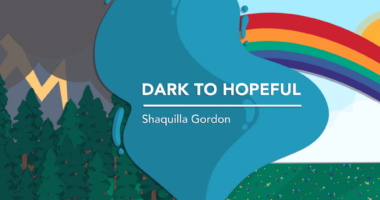How celebrating small wins helped me manage my emotions
Get reacquainted with the feelings of happiness, joy, serenity, and hope

When you are diagnosed with a chronic illness, no one hands you a manual telling you how you’ll feel. There is no explanation about the emotional journey you will embark upon. In addition to your health challenges, an important part of the battle will be learning how to manage your emotions.
Emotions can fluctuate from one day to the next, and from one extreme to another. In my case, a sudden and drastic change of life events caused me confusion and a rush of emotions I had a hard time navigating. When I was diagnosed with aplastic anemia and paroxysmal nocturnal hemoglobinuria (PNH), my main focus was on becoming well. I didn’t understand the importance of adopting good tools to help me emotionally. My emotions were driving the car, so to speak; they were the main reason for many of my decisions.
In the beginning, I couldn’t get past the question “Why me?” My mind had a hard time understanding why I was the one chosen for the fight of a lifetime. I just wanted my life to return to normal. Some days I thought maybe I’d wake up and it had all been a bad dream.
As my mind processed sadness, frustration, hurt, grief, anger, and more, I knew I had to find a way to withstand the difficulties. I began to see it as an important life lesson. I thought, “I have to find a way to remember the positive things happening in my life.”
Some days, dealing with fatigue, brain fog, bruises, and other symptoms made it hard to complete my daily tasks. These symptoms reminded me how negative my life was at the time, and I needed to remember the good things. I had to be intentional. I had to incorporate small wins into my everyday life.
Transformational power
What are small wins? When you want to accomplish a large goal, along the road, you’ll have small wins. These are small achievements you should celebrate because they move you closer to completing your goal. For me, a small win was making my bed in the morning. It was so hard to get out of bed due to severe fatigue, so making my bed after I got up was a win I celebrated.
According to Ideas.TED.com, educator and public speaker Mehrnaz Bassiri notes that, “Small wins have a transformational power. Once a small win has been accomplished, forces are set in motion to favor another small win and another small win until the combination of these small wins lead to larger and greater accomplishments.”
Noticing and celebrating the small wins in my life help to improve my emotional state. It’s as if a dark cloud parted to expose a sun beaming with happiness. My body feels a weight lifted as I get reacquainted with the feelings of happiness, joy, serenity, and hope.
I’ve noticed a pattern in my life: First, a negative emotion will set in. As I recognize and acknowledge it, I will undertake, complete, and celebrate a small win to offset my bad emotion. That makes me feel positive again.
My health battle hasn’t been easy, but small wins help me inch closer to accomplishing my greater goal of becoming healthy. Following are some of the small wins I have celebrated:
- Journaling
- Expressing my emotions
- Taking my medicine
- Seeking therapy
- Practicing gratitude
- Remembering small things
- Making my bed
- Spending time with family and friends
- Going to events
- Exercising.
If you celebrate small wins, please share in the comments below. I would love to know what helps you through hard times.
Note: PNH News is strictly a news and information website about the disease. It does not provide medical advice, diagnosis, or treatment. This content is not intended to be a substitute for professional medical advice, diagnosis, or treatment. Always seek the advice of your physician or other qualified health provider with any questions you may have regarding a medical condition. Never disregard professional medical advice or delay in seeking it because of something you have read on this website. The opinions expressed in this column are not those of PNH News or its parent company, Bionews, and are intended to spark discussion about issues pertaining to paroxysmal nocturnal hemoglobinuria.








